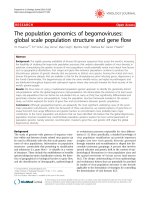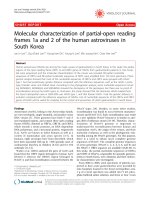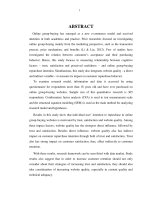A qualitative critical study of collaborative coteaching practices of English language teachers in public elementary schools in South Korea
Bạn đang xem bản rút gọn của tài liệu. Xem và tải ngay bản đầy đủ của tài liệu tại đây (1.43 MB, 16 trang )
A QUALITATIVE CRITICAL STUDY OF COLLABORATIVE
CO-TEACHING PRACTICES OF ENGLISH LANGUAGE TEACHERS
IN PUBLIC ELEMENTARY SCHOOLS IN SOUTH KOREA
A Dissertation
Submitted to the School of Graduate Studies and Research
in Partial Fulfillment of the
Requirements for the Degree
Doctor of Philosophy
Shannon Tanghe
Indiana University of Pennsylvania
December 2013
UMI Number: 3604004
All rights reserved
INFORMATION TO ALL USERS
The quality of this reproduction is dependent upon the quality of the copy submitted.
In the unlikely event that the author did not send a complete manuscript
and there are missing pages, these will be noted. Also, if material had to be removed,
a note will indicate the deletion.
UMI 3604004
Published by ProQuest LLC (2013). Copyright in the Dissertation held by the Author.
Microform Edition © ProQuest LLC.
All rights reserved. This work is protected against
unauthorized copying under Title 17, United States Code
ProQuest LLC.
789 East Eisenhower Parkway
P.O. Box 1346
Ann Arbor, MI 48106 - 1346
© 2013 Shannon Tanghe
All Rights Reserved
ii
Indiana University of Pennsylvania
School of Graduate Studies and Research
Department of English
We hereby approve the dissertation of
Shannon Tanghe
Candidate for the degree of Doctor of Philosophy
____________________
__________________________________________
Gloria Park, Ph.D.
Associate Professor of English, Advisor
____________________
__________________________________________
Sharon Deckert, Ph.D.
Associate Professor of English
____________________
__________________________________________
Linda Norris, Ph.D.
Professor of English
ACCEPTED
__________________________________________
Timothy P. Mack, Ph.D.
Dean
School of Graduate Studies and Research
iii
____________________
Title: A Qualitative Critical Study of Collaborative Co-Teaching Practices of English Language
Teachers in Public Elementary Schools in South Korea
Author: Shannon Tanghe
Dissertation Chair: Dr. Gloria Park
Dissertation Committee Members:
Dr. Sharon Deckert
Dr. Linda Norris
This study examines the teaching practices of three groups of co-teachers, six individuals
co-teaching in English language classrooms in public elementary schools in Gyeonggi province
in South Korea. The ways in which each of the teachers perceived their educational and
professional histories as impacting their co-teaching was also investigated with particular
attention to how the co-teachers negotiated the co-construction of their identities both within and
outside of the classroom context. This critical qualitative study used positioning theory (Davies
& Harré, 1990) to investigate the ways the teachers positioned themselves, one another and how
they were positioned by others as well as the effects on their teaching practices and identity
constructions. Data were collected through individual and partnered interviews, classroom
observations, and audio recorded co-planning sessions.
The results of this study indicate the teachers each had come to accept individualized
classroom roles, and had simultaneously negotiated to embrace complementary roles and
responsibilities with their co-teachers. The study found the teachers’ lived experiences, both
educational and professional histories, played key roles in shaping each teacher’s teaching
philosophies and practices. Complex layers and hierarchies of ownership of English and its
teaching emerged, as did the necessity to look beyond perceived linguistic competencies as being
the single identifying factor in identity construction, and to embrace more of teacher’s
iv
multifaceted identities. Additionally, it appears that based on current co-teaching practices, a deprofessionalization of English teachers in Korea is emerging. This study’s findings offer
implications for teacher identity, future public policy drafts on co-teaching in Korea, as well as
insight on co-teacher development training programs for teachers in Korea.
v
ACKNOWLEDGMENTS
At the very core of this dissertation study is the spirit and power of collaboration. As I
was researching and writing about collaborative practices, I was also experiencing firsthand over
and over again the power of collaboration. Throughout this dissertation process, so many people
have helped me in so many ways and I would like to express my gratitude to them.
Firstly, I am grateful to the co-teachers who took part in this study--JiHye and Ilham,
Nikki and YooMi, and John and MinJi—who so willingly gave of their time and experiences. I
am thankful for the way they opened up and shared their lives and experiences with me. The
strong passions and dedication these six have helped me to see the potential of collaborative coteaching.
Throughout this dissertation process, Dr. Gloria Park has helped me to develop in so
many ways—as a writer, a researcher, a scholar, a teacher, and as a person. When I reflect on
my lifelong academic journey, I see a marked turning point in meeting Dr. Park. Giving so
generously of her time, knowledge and knowhow, I have found a role model and a mentor that I
strive to emulate both in and out of the classroom.
When I was in my first summer at IUP my world was rocked through an amazing class
and discussions with Dr. Sharon Deckert. My perspectives were forever changed and I sincerely
thank her for all the continued thought-provoking opportunities which continue to open up my
eyes, always challenging me to de-construct and think about things differently. I am also very
grateful to Dr. Linda Norris for her insight and feedback on my dissertation, for sharing her time
and wisdom.
All those studying in the C&T program at IUP, particularly my summer cohort, have
been incredible, helping to enrich my experiences at IUP and to have fun in the process. I look
vi
back on those summers together as some of the most meaningful and enjoyable summers I have
experienced. I grew academically as we struggled together, bonding and co-constructing
knowledge together. I am grateful for having met each one of them and my memories of Locust
Street will not be forgotten!
At every stage of my life my family has always been there for me. From the day I was
born, I have been blessed to have been surrounded with people who continually inspire me
through words and actions alike. I am forever grateful to my parents, Greg and Dar Tanghe, for
all they have done. My first and most important role models in my life, they are the ones who I
always try to follow in the footsteps of in so many ways. They have earned this degree as much
as I have through their continued support. Mom has literally been with me every step of the way,
spending her summers with me in Indiana, PA, taking care of the boys so I could focus on my
studies and providing emotional support every day. I quite literally could never have done this
without her. My dad has also helped enormously at every stage of this journey. They are truly
the greatest!
My mother-in-law, Kim BooGeum, has been amazing in many ways, having always
unconditionally loved and accepted me even before we could communicate. An amazingly
strong woman who continues to pass her strength and love down to future generations, thank you.
The support and constant encouragement of my husband, ByungDuk, has sustained me
through the seemingly endless stages of research, writing and revising. He is my rock, the one
who I can always count on to help me to find balance in my life, always there to help me to see
that everything really is possible. He also has helped me to realize the true potential of what can
happen when two people co-collaborate in life. My boys, Jay, Josh, and Sammy, have perhaps
endured the most in this dissertation process. They have cheerfully accompanied me to summers
vii
at IUP, always looking for adventures and patiently waiting for me to finish. Though young in
years, they understand so much and their constant support and encouragement has given me the
strength to complete this.
To my siblings, Ryan, Tara, and Alison and all of their families, though we live
thousands of miles apart, I always appreciate the way we are forever connected at the heart as
they continue to encourage and support me on this dissertation journey as well as the journey of
my life.
YeEun Na has been a great friend who has helped to make the past few years much more
enjoyable. When I wanted to lock myself in a room with my dissertation, she helped me to
remember to enjoy life and to take time to experience the world and to have fun. Her support
and encouragement helped me to find balance and to make this process a much more enjoyable
one.
In completing this dissertation I have experienced and felt the collaborative spirit that has
been molded and shaped in myself through others. Each person mentioned here as well as many
others have influenced not only this study but have also had great impact upon my life. Through
the past few years as I completed this dissertation study, I have grown and have come to truly
know the power of collaboration. I look forward to what the future holds and to continuing to
grow together with each one of you.
viii
TABLE OF CONTENTS
Chapter
ONE
Page
INTRODUCTION TO THE STUDY..............................................................................1
The Beginning ..........................................................................................................1
General Description of Co-Teachers in Korean Public Elementary Schools ..........4
Trends in Co-Teaching in English Education in Korea ...........................................5
Purpose of the Research ...........................................................................................6
Research Questions ..........................................................................................7
Theoretical and Methodological Approaches ...........................................................8
Critical Qualitative Study ................................................................................8
Positioning Theory ...........................................................................................9
Characteristics of Prospective Participants ......................................................9
Data Sources ..................................................................................................10
Preview of the Literature .......................................................................................10
Co-Teaching ...................................................................................................10
Identity Co-Construction and Negotiation in Co-Teaching ........................... 12
Significance of the Study .......................................................................................12
Chapter Summaries ................................................................................................12
TWO
THEORETICAL PERSPECTIVES AND LITERATURE INFORMING THE
STUDY ..........................................................................................................................15
Rationale for Critical Theory .................................................................................15
Positioning the Study within a Critical Paradigm ..........................................17
Positioning Theory .................................................................................................18
Positioning the Study within Positioning Theory ..........................................20
Understanding the Multiplicities of Collaborative and Co-Teaching
Constructs ..............................................................................................................22
Models of Co-Teaching .........................................................................................26
History of “Team Teaching” in the Global Context ..............................................26
Co-Teaching in Special Education.................................................................29
Co-Teaching in Global EAL Contexts...........................................................30
Unpacking the Korean Educational System ..........................................................34
Prevalent Issues in Co-Teaching Literature ...........................................................38
Labeling Practices ..........................................................................................38
Native Speaker Fallacy ..................................................................................39
Essentialization ..............................................................................................40
Discriminatory Practices ................................................................................42
Co-Teaching in East Asian Contexts .....................................................................44
The Beginning of Co-Teaching in English Language Classes in Korea .......45
Research on Co-Teaching in the Korean Context..........................................45
ix
Teacher Identity Construction................................................................................48
Chapter Summary ..................................................................................................50
THREE METHODOLOGY........................................................................................................51
Unraveling the Intricacies of Co-Teaching ............................................................51
Researcher’s Positionality aka Inevitable Influences ............................................52
The Formation of the Study ...................................................................................53
My Own Collaborative Co-Teaching Experiences ........................................54
Life as a Foreign Graduate Student in Korea.................................................56
Living as a Teacher-Scholar in Korea ...........................................................57
My Own Lived Experiences Positionality .....................................................57
Rationale for Qualitative Research Design ............................................................60
Procedure for Selection of Participants..................................................................62
The Research Context ............................................................................................63
Research Sites ................................................................................................63
Overview of Research Design ...............................................................................64
Data Collection Methods .......................................................................................68
Interviews .......................................................................................................68
Individual interviews .............................................................................69
Partner interviews ..................................................................................70
Classroom Observations ................................................................................70
Recording of Cooperative Planning Session..................................................72
Artifacts..........................................................................................................72
Teaching Journals ..........................................................................................73
Researcher’s Journal ......................................................................................74
Overcoming Methodological Challenges ..............................................................75
Methods for Data Analysis and Synthesis .............................................................77
Data Analysis Tools .......................................................................................77
Ethical Considerations ...........................................................................................80
Trustworthiness ..............................................................................................81
Credibility ......................................................................................................82
Transferability, Dependability, and Confirmability.......................................83
Limitations of the Study.........................................................................................84
Chapter Summary and Preview of Teacher Dyads ................................................86
OhRini Elementary School ............................................................................87
Nikki ....................................................................................................88
(Tracy) YooMi .....................................................................................89
AhYi Elementary School ...............................................................................90
(Cindy) JiHye .......................................................................................91
Ilham ....................................................................................................92
SoIn Elementary School ................................................................................92
John ......................................................................................................93
MinJi ....................................................................................................94
Dyad Chapters Organization ................................................................................. 95
x
FOUR
NIKKI & (TRACY) YOOMI........................................................................................97
Nikki & (Tracy) YooMi .........................................................................................97
Collaborative Co-Teaching ....................................................................................97
Off To a Rocky Start ......................................................................................97
Collaborative Co-Planning...........................................................................100
Collaborative Co-Teaching ..........................................................................102
Value in Co-Teaching: “It Works” ............................................................. 105
Educational Differences: “They’re Really Teaching” ................................ 109
Out of the Loop: “No One’s Ever Told Me.” ............................................. 112
“Only an English Teacher” ......................................................................... 113
Word Choices: English Teachers? Foreign Teachers? Korean Teachers?
Native Teachers? Teachers? My Students? Her Students? ........................ 114
Positioning: Self, Each Other, and by Others ......................................................116
YooMi, the “Lead Teacher” ........................................................................ 116
Nikki, the “Native English Speaker” .......................................................... 116
Reciprocated Understandings ......................................................................117
Molding to Fit ..............................................................................................117
Effects of Being Positioned .........................................................................118
An Intersection of Marginalization and Privilege ........................................120
FIVE
(CINDY) JIHYE & ILHAM .......................................................................................122
(Cindy) JiHye & Ilham ........................................................................................122
Collaborative Co-Planning...........................................................................122
A Look inside the Classroom .......................................................................124
Personalities: “Because of My Personality, I Irritate Her a Lot and
Likewise”……………………….................................................................128
“I Feel Like…Teaching Machine”.............................................................. 129
Different Teaching Philosophies..................................................................130
JiHye: “I want to give them motivation,” but “they have to
take this national test” ........................................................................ 130
Ilham: “I find the curriculum…extremely useless” ............................ 131
Value: “I Need to Be a Native Speaker” ..................................................... 132
Mirrored Mutual Appreciation and Respect ................................................134
Positioning: Self, Each Other, and by Others ......................................................135
Ilham, “A Foreign Teacher who Speaks English” ...................................... 135
JiHye’s Conflicts ..........................................................................................137
Dichotomous Thinking ................................................................................139
“Different Situation” .................................................................................... 140
“On the Peripheral” ......................................................................................144
xi
SIX
JOHN & MINJI ...........................................................................................................146
John & MinJi........................................................................................................146
“I Start My [Co-Teaching] Life Very Tough” ............................................ 146
“Foreigners” Teaching in Korea ..................................................................147
“We Found That Magic” ............................................................................. 148
Co-Teaching in the Classroom.....................................................................150
Roles: “She’s the Witch and I’m the Fun”.................................................. 152
Respect .........................................................................................................155
“Real English is His Part” ........................................................................... 157
“She’s Leaving. I Want To Go Too” ...........................................................161
The Power of “Outside Forces” .................................................................. 162
Positioning: Self, Each Other, and by Others ......................................................163
“Foreigner” and “Korean” .......................................................................... 163
Agreement and Negotiation in Positioning ..................................................165
Lack of Respect............................................................................................166
Parental Power .............................................................................................167
SEVEN ANALYSES OF THREE DYADS .............................................................................169
Introduction ..........................................................................................................169
Perceptions of Roles ............................................................................................169
Differing Teaching Philosophies via Diverse Lived Experiences .......................173
Educational Histories ...................................................................................174
Professional Histories Together ...................................................................175
Native Speakerism and Language Ownership .....................................................176
Multifaceted Identities .........................................................................................177
Hierarchy and De-Professionalization .................................................................179
Acceptance ...........................................................................................................180
Preview of Chapter Eight .....................................................................................182
EIGHT DISCUSSION, IMPLICATIONS, & FUTURE RESEARCH DIRECTIONS ..........183
Introduction ..........................................................................................................183
Reflecting on the Purposes of the Study ..............................................................183
Research Questions Revisited ..............................................................................185
Emergent Themes ................................................................................................186
Accepting Complementary but Individualized Roles and
Responsibilities ............................................................................................187
Lived Experiences Shape Teaching Philosophies and Practices .................188
Complex Layers and Hierarchies of Ownership of English and its
Teaching .......................................................................................................190
More than Perceived Linguistic Competencies: Legitimate Teacher
Identities .......................................................................................................191
De-Professionalization of English Teachers in Korea .................................192
xii
Implications..........................................................................................................193
Teacher Identity ...........................................................................................193
Public Policy on Co-Teaching in South Korea ............................................197
Co-Teacher Training in South Korea ..........................................................199
Cooperation ..........................................................................................204
Compatibility .......................................................................................205
Context .................................................................................................207
Future Research Directions ..................................................................................210
Concluding Thoughts ...........................................................................................211
REFERENCES ..........................................................................................................................213
APPENDIXES ...........................................................................................................................234
Appendix A – Approved IRB Letter ......................................................................................234
Appendix B – Individual Interview Protocol .........................................................................235
Appendix C – Partner Interview Protocol ..............................................................................237
Appendix D – Class Observation Protocol ............................................................................238
Appendix E – Cooperative Planning Session Protocol ..........................................................240
Appendix F – Teacher Journaling Protocol ...........................................................................241
Appendix G – Voluntary Informed Consent Form for IRB for Dissertation Study
Research .........................................................................................................242
Appendix H –Transcription Conventions…………………………………………………..244
Appendix I – Description of Roles………………………………………………………… 245
Appendix J – Groups Teachers Identified With ....................................................................250
xiii
LIST OF TABLES
Table
Page
1
Data Sources Informing Research Questions……………..…………………………65
2
Data Collected and Collection Methods……………..… ……………………………66
3
Demographics on Participating Teachers…………………………………………....87
4
Complementary Ways Teachers Described Own and Co-Teacher’s Roles………...169
5
Teachers’ Educational Experiences……………………...…………………………174
6
Length of Time Each Dyad Has Co-Taught Together…………………………...…176
xiv
LIST OF FIGURES
Figure
Page
1
Continua of target language proficiency and professional preparation………………...195
2
Visual representation of co-construction of co-teachers’ teacher identities……………196
xv









